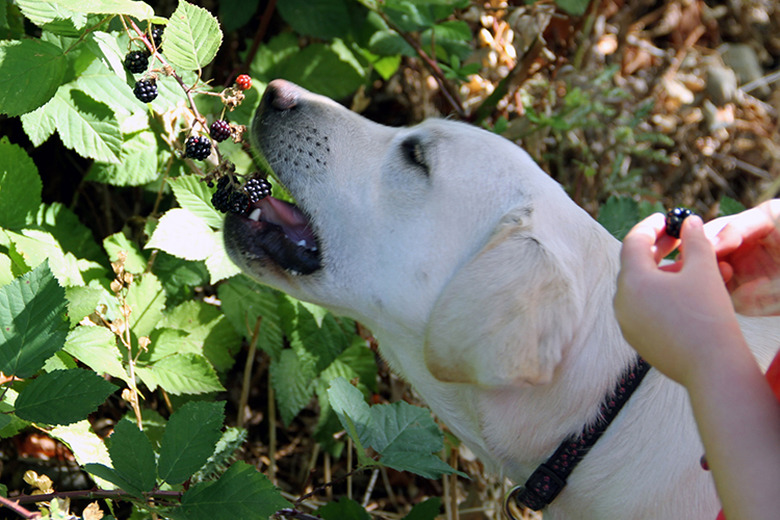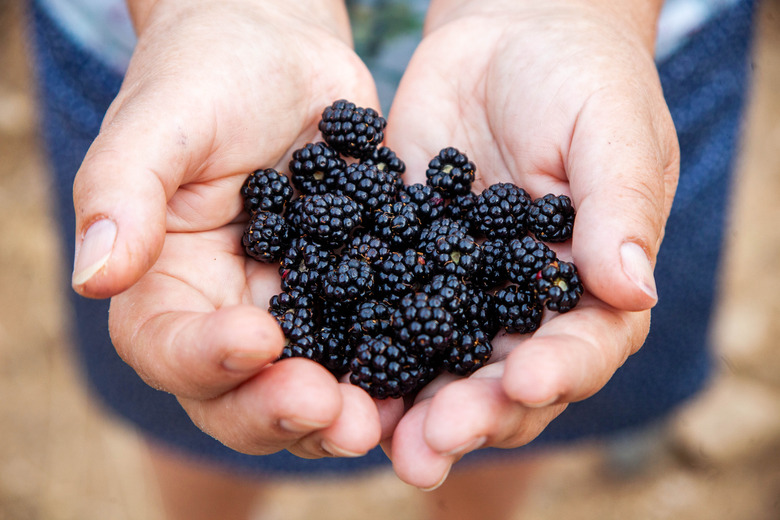Can Dogs Eat Blackberries?
Treating your canine companion to chocolate, onions, garlic, and grapes is not safe, but thankfully, blackberries are one fruit that you can safely feed your pet. Blackberries offer many nutritional benefits to your dog while providing a sweet little treat. Served alone, mixed with his food, or added to a homemade treat, blackberries may easily become your dog's new favorite "people snack."
Benefits of blackberries for dogs
Benefits of blackberries for dogs
Blackberries provide a good source of antioxidants, vitamins, minerals, fiber, and omega-3. Omega-3 is an essential fatty acid that helps keep your dog's skin and coat healthy. Fiber is important for your dog's digestion. Antioxidants help decrease cell damage. Minerals, like potassium, zinc, calcium, and copper, help dogs stay healthy inside and out because they aid their organs, teeth, skin, and coat.
Additionally, blackberries contain vitamins A, C, D, E, and K. Vitamin A supports a dog's vision, immune system, and reproduction. Vitamin E supports a dog's immune system and helps support cell and liver function, heart health, and muscles. Vitamin K helps a dog's blood clot. Both vitamins A and D support bone growth, which is particularly important for senior dogs as they age.
Serving blackberries to dogs as treats
Serving blackberries to dogs as treats
Blackberries offer various nutritional benefits but should always be served in moderation just like any other treat you give to your dog. Just like humans, too many blackberries may upset their stomach. Begin by serving just a few blackberries to your dog and monitor her for stomach upset or diarrhea. If your dog tolerates them well, add a couple to her food or offer a few straight from your hand as an occasional treat.
While serving dogs plain, fresh blackberries or dog-friendly blackberry treats is OK, it's never acceptable to serve your dog blackberry jam, blackberry pie, or any other human food made from blackberries. Recipes often call for ingredients that dogs shouldn't ingest, and jam includes ingredients that can harm your dog, like sugar and preservatives.
When served blackberries, dogs might enjoy them or might not. Just like people, dogs enjoy different tastes and textures, and if your dog doesn't seem to like blackberries, that's OK.
Considerations for feeding blackberries to dogs
Considerations for feeding blackberries to dogs
Before adding any new foods to your dog's diet, always consult a veterinarian or canine nutritionist. Dogs have a sensitive stomach, and your veterinarian will know their health best.
Blackberries are relatively low in calories (a 1-cup serving of raw blackberries has only 62 calories), making them a perfect occasional treat that won't add a lot of weight to your precious dog. If your dog suffers from weight problems, serving one or two blackberries allows you to offer a sweet and nutritious treat without a large amount of calories.
However, blackberries should never be served to diabetic dogs since they contain sugar. Blackberries can also contain trace amounts of xylitol, which is toxic to dogs, but dogs would need to eat a large amount of blackberries to be poisoned. In rare cases, dogs can be allergic to fruits, like blackberries.
Blackberry treat recipe for dogs
Blackberry treat recipe for dogs
3/4 cup peanut butter (without xylitol)1/4 cup water1/8 cup oil1 egg1 cup blackberries2 1/2 cups almond flour1/2 cup oat flour1/2 cup oat bran
3/4 cup peanut butter (without xylitol)1/4 cup water1/8 cup oil1 egg1 cup blackberries2 1/2 cups almond flour1/2 cup oat flour1/2 cup oat bran
Preheat the oven to 350 degrees. Mix all of the ingredients in a medium mixing bowl and then knead the dough. Roll out the dough and use a cookie cutter to cut out small pieces before placing the treats onto a lightly greased cookie sheet. Cook the treats for 25 minutes. Remove them from the oven and let the dog treats cool completely. Store the treats in an airtight container in the refrigerator.


